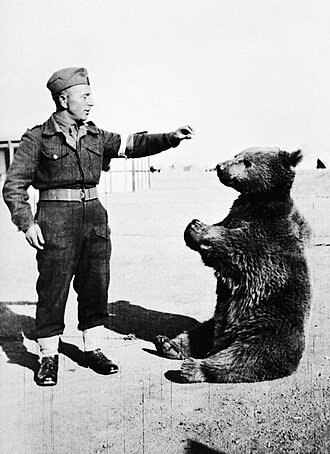
To listen to today’s reflection as a podcast, click here
Humanity’s most heartbreaking conflict produced one of its most heartwarming stories.
Today there are at least a dozen memorials in five different countries that honor Wojtek, the bear that went to war.
The saga of Wojtek (pronounced VOY-tech) began in the spring of 1942, when thousands of Polish soldiers and civilians – all of them driven from their homeland during the first days of World War II – migrated toward Iran, where they hoped to assemble as an Allied fighting force.
As they approached Teheran, some of the soldiers came across a young Iranian boy carrying a sack. Inside was an orphaned Syrian brown bear cub. Yearning for companionship, the soldiers traded canned goods and chocolate for the little cub.
As the bear grew, he became more than just a mascot.
The soldiers of the 22nd Artillery Supply Company adopted him as one of their own, dubbing him Wojtek, a common Polish nickname meaning “joyful warrior.”
Wojtek dined on marmalade, honey, syrup, and his over-the-top favorite, beer. He drank coffee every morning and enjoyed an occasional smoke – that is, if he didn’t eat the cigarettes first. The bear learned to salute when greeted and even walked alongside his band of brothers on his hind legs, imitating their movements.
Wojtek regularly took jeep rides. On cold nights, he snuggled with the soldiers, keeping them warm. And yes, the picture attached to this post really is a picture of him posing with one of his comrades.
No wonder the men were devastated to learn they had been assigned to join the British army that was battling its way through central Italy. That would require a boat trip across the Mediterranean – and the British absolutely forbade the transporting of pets and animal companions.
The soldiers, however, found a loophole.
Wojtek was officially drafted into the Polish Army. He was given a serial number, uniform, paybook, and the rank of private.
In a matter of weeks, the bear found himself in the middle of one of the fiercest firefights of World War II – the assault on Monte Cassino.
Wojtek was now almost six feet tall and weighed at least 200 pounds. With shells exploding around him, he lugged 100-pound ammunition crates – a feat which typically required the efforts of four soldiers – up the steep slopes. According to those who watched, amazed, he never dropped a crate.
When Allied generals and statesmen arrived to celebrate the Polish victory, Wojtek quickly became the center of attention. He was officially promoted to the rank of corporal.
At war’s end, the 22nd Company was sent to Scotland for decommissioning. Wojtek took up residence at the Edinburgh Zoo, where he ultimately weighed at least 1,100 pounds and lived until 1963. Whenever his old mates dropped in to say hello, he seemed delighted to be greeted once again in Polish.
Today his story is told and retold by means of plaques, statues, movies, and at least one children’s book.
Which has to prompt us to ask: Why?
Why is the story of this bear cub-companion so deeply cherished in Poland, Iran, Italy, England, and Scotland?
One of the reasons is that it stands apart from the sheer horror and cruelty of a war that took as many as 85 million lives.
Few nations suffered as grievously as Poland. Yet the Polish soldiers of the 22nd Company – driven from their homes by both Nazi and Soviet invaders, separated from their families, given little reason to hope that life would ever feel normal again – chose to act so human.
Even as the Third Reich mocked the virtues of mercy and compassion, others demonstrated that they could not and would not – even when threatened by guns and gas chambers – walk away from whowe really are according to the opening chapters of Genesis.
We are created in God’s image.
We are made to love and care for each other.
We are wired to value courage and faithfulness.
We are called to care for all of God’s creatures.
And God himself is at the center of everything.
All of those realities are reflected in the Bible’s snapshots of the coming new creation (see Isaiah 65:17-25 and Revelation 22:1-5).
Wojtek’s account reminds us that even when circumstances seem to be at their worst, God has shaped us in such a way that we will always be deeply touched by stories of love and loyalty.
A broken world, it turns out, can still be a beautiful place.
